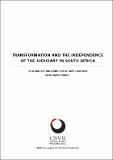|
Reseña:
|
Reseña:The saga of the justice bills, ostensibly intended to improve court management and efficiency, rationalise court structuresand promote transformation of the judiciary, has been one of the biggest tests for judicial independence in the post-apartheidperiod. At this point in time, it seems that the overall impact of this episode has not only been benign but that it may havecontributed to a strengthening and deepening of understanding about the meaning of judicial independence among the variousconcerned role players in South Africa.Focusing on the issue of judicial independence and transformation in South Africa, this paper discusses not only the justicebills but also other matters related to this topic, including the overall attitude of government and the ruling African NationalCongress (ANC) toward judicial independence. The paper also discusses the process of judicial appointments and thefunctioning of Judicial Services Commission (JSC), examining questions about whether the government uses the JSC processto create a judiciary that complies with and is aligned with governmental policies.2This paper is intended to provide a perspective on questions related to the independence of the judiciary in present-day SouthAfrica. While South Africa is no longer in the heart of its political transition, the legacy of apartheid rule is still strongly feltand post-apartheid “transformation” continues to be a central concern of government and society more broadly. But how doesjudicial independence relate to transformation? Rather than conceiving of it as a separate issue, this paper departs from thepoint of view that the consolidation of judicial independence is a key dimension of the process of judicial transformation inSouth Africa. If this is so, the question arises as to whether there may be tensions between independence and other key elementsof transformation, including the creation of a judiciary that is representative of the people and that is dedicated to protectingand promoting South Africa’s constitutional values, fostering an atmosphere of judicial accountability, and improving theefficiency and appropriateness of the justice system to ensure access to justice for all people.The saga of the justice bills, ostensibly intended to improve court management and efficiency, rationalise court structuresand promote transformation of the judiciary, has been one of the biggest tests for judicial independence in the post-apartheidperiod. At this point in time, it seems that the overall impact of this episode has not only been benign but that it may havecontributed to a strengthening and deepening of understanding about the meaning of judicial independence among the variousconcerned role players in South Africa. Focusing on the issue of judicial independence and transformation in South Africa, this paper discusses not only the justicebills but also other matters related to this topic, including the overall attitude of government and the ruling African NationalCongress (ANC) toward judicial independence. The paper also discusses the process of judicial appointments and thefunctioning of Judicial Services Commission (JSC), examining questions about whether the government uses the JSC processto create a judiciary that complies with and is aligned with governmental policies. This paper is intended to provide a perspective on questions related to the independence of the judiciary in present-day SouthAfrica. While South Africa is no longer in the heart of its political transition, the legacy of apartheid rule is still strongly feltand post-apartheid “transformation” continues to be a central concern of government and society more broadly. But how doesjudicial independence relate to transformation? Rather than conceiving of it as a separate issue, this paper departs from thepoint of view that the consolidation of judicial independence is a key dimension of the process of judicial transformation inSouth Africa. If this is so, the question arises as to whether there may be tensions between independence and other key elementsof transformation, including the creation of a judiciary that is representative of the people and that is dedicated to protectingand promoting South Africa’s constitutional values, fostering an atmosphere of judicial accountability, and improving theefficiency and appropriateness of the justice system to ensure access to justice for all people. |

